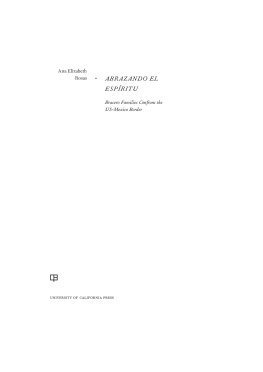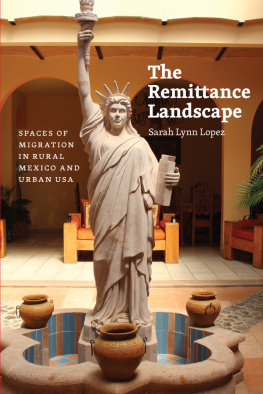AMERICAN CROSSROADS
Edited by Earl Lewis, George Lipsitz, George Snchez, Dana Takagi, Laura Briggs, and Nikhil Pal Singh
Ana Elizabeth Rosas
ABRAZANDO EL ESPRITU
Bracero Families Confront the US-Mexico Border

UNIVERSITY OF CALIFORNIA PRESS
University of California Press, one of the most distinguished university presses in the United States, enriches lives around the world by advancing scholarship in the humanities, social sciences, and natural sciences. Its activities are supported by the UC Press Foundation and by philanthropic contributions from individuals and institutions. For more information, visit www.ucpress.edu.
University of California Press
Oakland, California
2014 by The Regents of the University of California
Library of Congress Cataloging-in-Publication Data
Rosas, Ana Elizabeth, 1978
Abrazando el espritu : Bracero families confront the US-Mexico border / Ana Elizabeth Rosas.
pages cm. (American crossroads ; 40)
Includes bibliographical references and index.
ISBN 978-0-520-28266-7 (cloth : alk. paper) ISBN 978-0-520-28267-4 (pbk. : alk. paper) ISBN 978-0-520-95865-4 (e-book)
1. Foreign workers, MexicanFamily relationshipsUnited StatesHistory20th century. 2. Migrant agricultural laborersFamily relationshipsUnited StatesHistory20th century. 3. MexicansUnited StatesSocial conditions20th century. 4. FamiliesMexicoSocial conditions20th century. 5. Immigrant familiesUnited StatesSocial conditions20th century. 6. MexicoEmigration and immigrationSocial aspects. 7. United StatesEmigration and immigrationSocial aspects. I. Title.
HD 8081. M 6 R 66 2014
305.86872073dc232014010258
Manufactured in the United States of America
23 22 21 20 19 18 17 16 15 14
10 9 8 7 6 5 4 3 2 1
In keeping with a commitment to support environmentally responsible and sustainable printing practices, UC Press has printed this book on Natures Natural, a fiber that contains 30% post-consumer waste and meets the minimum requirements of ANSI/NISO Z 39.481992 ( R 1997) ( Permanence of Paper ).
En memoria de mis abuelitas y abuelitos:
Francisca Ramirez Medina y Desiderio Ahumada Medina
Josefina Gomez Rosas y Manuel Ricardo Rosas
Para mi familia:
Francisco Rosas Gomez, Dolores Rosas Medina, y Abigail Rosas
Su cario, ingenio, oraciones, y valor han hecho este libro una realidad
Para los de mi barrio:
Su nimo y lucha iluminaron el camino
Para mis estudiantes de Chicana/o studies:
Nuestras conversacines y sus logros mantuvieron vigente la urgencia de escribir con coraje y corazn
Para todas las familias inmigrante:
Nuestra lucha sigue
Para los que ya no estan
Para los que estan aqui
Y para los que vienen
For those who are no longer here
For those who are here
For those who are on their way
Calle 13, PAL NORTE (To the North), Residente o visitante, 2007
CONTENTS
ILLUSTRATIONS
ACKNOWLEDGMENTS
This history would have never been written had it not been for Dr. George J. Sanchezs mentorship. Beginning in 1998 and to this very day, Dr. Sanchez has been a generous mentor to me, and the more I am a part of this profession the more I am convinced that he is one of the best mentors in the nation. Upon enrolling in his undergraduate course The History of the Mexican American at the University of Southern California (USC), I became inspired to research further a subject that was at best a fraction of what Dr. Sanchez shared with his students in this course and, over time, with the thousands of women and men participating in his many conferences, programs, workshops, and forums in support of a truly interdisciplinary and diverse education at this and countless campuses nationwide. His affording us the confidence, trust, and funding to pursue our own research with honesty, rigor, and heart at a campus in which this was a rarity for a first-generation working-class Mexican immigrant female undergraduate student like me transformed my thinking and in turn my world. Dr. Sanchezs brilliantly expansive investigation and teaching of the Chicana/o experience reaffirmed for me that becoming a Chicana historian was not only possible but worthwhile.
More concretely, since day one, Dr. Sanchez refused to give up on me or on what would become my publication of this history. With unparalleled high standards and humanity, he mentored me through my participation in USCs Ronald E. McNair Scholars Program; a cruel first year of graduate study at USC; USCs Ahmanson Foundations Fellowship Program; USCs first dissertation workshop in the Department of American Studies and Ethnicity; a Latina/o Studies Fellowship from the Smithsonian Institutions National Museum of American History; a Doctoral Fellowship from the Ford Foundation; and a fellowship from Stanford Universitys Bill Lane Center for the Study of the West. He provided extensive comments and editorial recommendations on what went on to become an award-winning dissertation; with his equally supportive wife, Debra Sanchez, he opened his family home to me when I was transitioning out of USC; and he was most persistent in my not allowing my perfectionist streak and voluminous research to delay my submission of this history for publication.
Years of working with me on my BA and doctorate in history did not discourage Dr. Sanchez from selflessly giving of his precious energy, time, and editorial wizardry to advance the publication of this book. Hence, it is with great respect that I detail his unwavering and meticulous efforts in support of my working in a profession as part of a larger struggle for a more just society that has immeasurably improved my life. I hope that if he reads this expression of my gratitude he understands why, even after more than fifteen years, I still call him Dr. Sanchez and not George as other colleagues do: it is my small way of honoring his commitment to my education. He will always be a person worthy of my utmost and wholehearted respecta true profesor, as my late grandmother Francisca Medina Ramirez used to say.
Among the introductions that my participation in Dr. Sanchezs dissertation workshop made possible, none was as generative as my meeting to share and discuss my dissertation proposal with Dr. Vicki L. Ruiz. In 2003, when I first met Dr. Ruiz, she made sure that I left with a renewed confidence in the promise of pursuing a doctorate in history. Before this meeting, no other professor of womens history had treated my work with the respect with which Dr. Ruiz reviewed my dissertation proposal. Our working well together at this workshop and in continued correspondence resulted in her serving on my dissertation committee, acting as my faculty mentor for the University of California Presidents Postdoctoral Fellowship Program, and now being my chair and colleague as part of the University of California Irvines (UCI) departments of Chicano-Latino studies and history. These stages of my career and her role within them have substantially strengthened my investigation and writing of this history. She has transformed each of these opportunities and interactions into invaluable projects from which I have been able to grasp what is possible when one writes from the heart. Throughout the last couple of years, her support of my publication of this book and my work at UCI have made evident just how much she believes in the promise of being generous with what we know.





